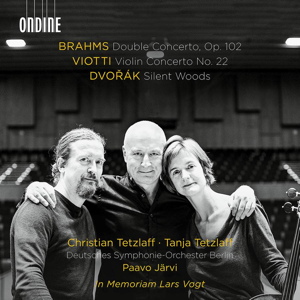
Johannes Brahms (1833-1897)
Concerto for violin and cello in A minor, Op 102
Giovanni Viotti (1755-1824)
Violin Concerto No 22 in A minor (W22/G.97)
Antonín Dvořák (1841-1904)
Silent Woods (“Waldesruhe”) for cello and orchestra, Op 68 No 5
Christian Tetzlaff (violin), Tanja Tetzlaff (cello)
Deutsches Symphonie-Orchester Berlin/Paavo Järvi
rec. 2022, Haus des Rundfunks & Großer Sendesaal, Berlin, Germany
Reviewed as a digital download from a press preview
Ondine ODE1423-2 [60]
It was a nice gesture for Christian and Tanja Tetzlaff to dedicate this CD to the memory of their friend and colleague, Lars Vogt, pianist extraordinaire, who died from cancer at the age of 51 last year. That said, I found the mix of items on the programme a bit odd. The Tetzlaffs in their conversation with Friederike Westerhaus, as printed in the disc’s booklet, indicate the appropriateness of the selections and their connection to each other. I fully accept having the Brahms Double Concerto and Dvořák’s Silent Woods together, but the Viotti concerto seems out of place in this company. The justification for the latter is that it’s in the same key as the Brahms and was admired by him. Both concertos also relate to the violinist Joseph Joachim, for whom Brahms composed his concerto as a gesture of reconciliation, and who apparently had the Viotti work in his repertoire. In addition, Christian Tetzlaff points to passages in Brahms’s work that refer back to the Viotti concerto. All this seems a bit tenuous to me, but the three pieces on the CD give the soloists ample opportunity to display their talents individually and together. Lars Vogt recorded the Brahms piano trios with the Tetzlaffs and conducted the Dvořák Cello Concerto with Tanja as soloist, which easily justifies including Brahms and Dvořák here. Robin Ticciati was originally to have conducted the Brahms concerto for the Tetzlaffs, but because of illness, Paavo Järvi stepped in to replace him. Both conductors were friends of Vogt according to Christian Tetzlaff.
The performances are all excellent, though I have some reservations with the interpretation of the Brahms Double Concerto. The artists are terrific in the first movement of the piece, selecting a tempo that seems perfect to convey all the power of the music. Thereafter, I find them too hasty. The second movement flows at a legitimate Andante tempo, but is rather plain and lacks the warmth of two of my favourites, the classic Zino Francescatti and Pierre Fournier recording with Bruno Walter on Sony and the more recent Naxos disc with Tianwa Yang and Gabriel Schwabe with the same orchestra as that on this new disc, under Antoni Wit (review). Timings of course do not tell the whole story, but it is interesting to compare this movement with that in the other accounts: Walter [7:56], Wit [7:20], and Järvi [6:35]. I found the finale in the performance under review even less agreeable. The soloists start off well enough at a somewhat faster tempo than usual, though when Järvi takes over everything seems so brusque. The movement is marked Vivace non troppo, but these artists do not adhere to the “non troppo” in my way of thinking. At least they agree on the tempo, whereas in the famous Oistrakh, Rostropovich, Szell performance (EMI) the conductor lurches ahead at a quicker speed than the soloists. Nonetheless, Christian and Tanja Tetzlaff are well-matched soloists and on their own are convincing in this work. I am afraid it is Järvi, who is responsible for what seems more dutiful than inspired. I will take Walter here any time, even with a few patches of less than perfect intonation by the orchestra. For me this concerto is like chamber music writ large and the Francescatti/Fournier account is still my touchstone.
Christian Tetzlaff then gets the opportunity to show off his formidable technique in the flashy Viotti Violin Concerto, the best known of his twenty-nine such works. It used to be more popular than it is now. The first time I heard it was on LP with Isaac Stern and the Philadelphia Orchestra under Eugene Ormandy. It is a fun piece with little substance, whose composer apparently influenced Paganini. As I indicated, I do not quite see how it fits with the rest of the programme. It holds no terrors for Tetzlaff, while the orchestra has little to add in its part.
While I was writing this review, another one by David McDade appeared on the website. I can only agree with him in his words that “the most moving aspect of this tribute comes with the warm simplicity of Dvořák’s Silent Woods.” Tanja Tetzlaff captures the warmth and pensiveness of the short piece with perfection and the orchestra accompanies well, with the composer’s delectable woodwind parts nicely audible.
I imagine this disc will appeal above all to fans of the artists and in its way is an appropriate tribute to a wonderful pianist whose life ended way too soon.
Leslie Wright
Previous review: David McDade
Help us financially by purchasing from




















